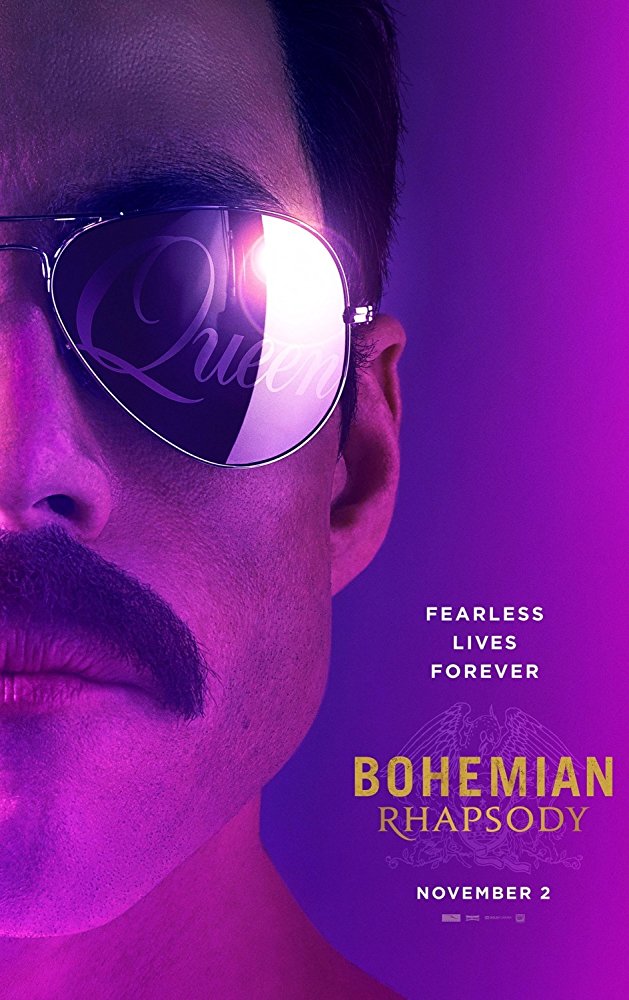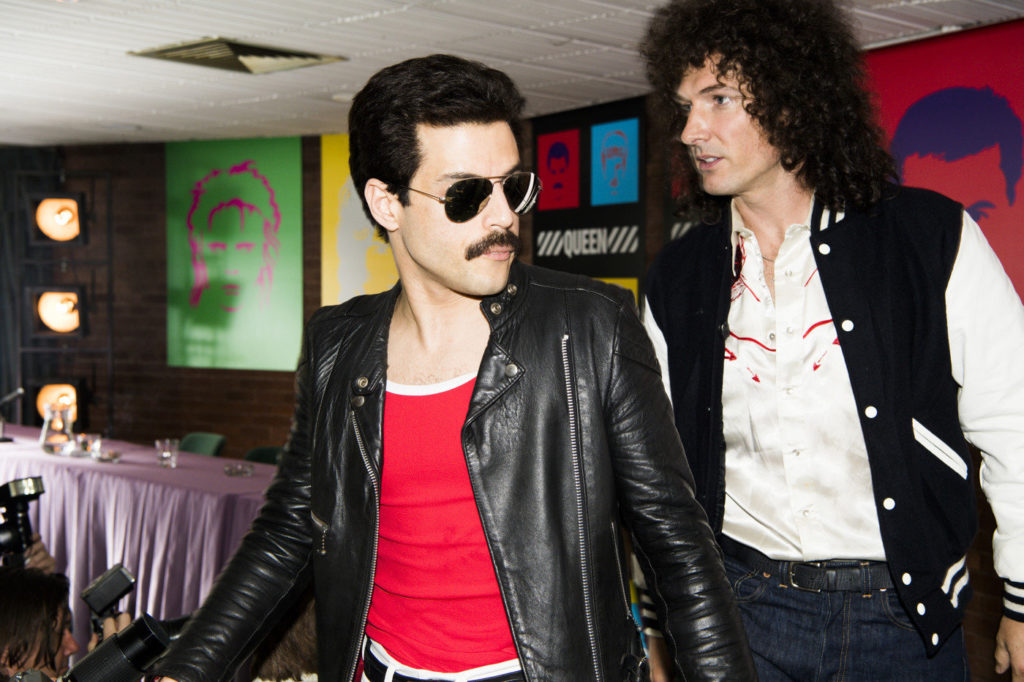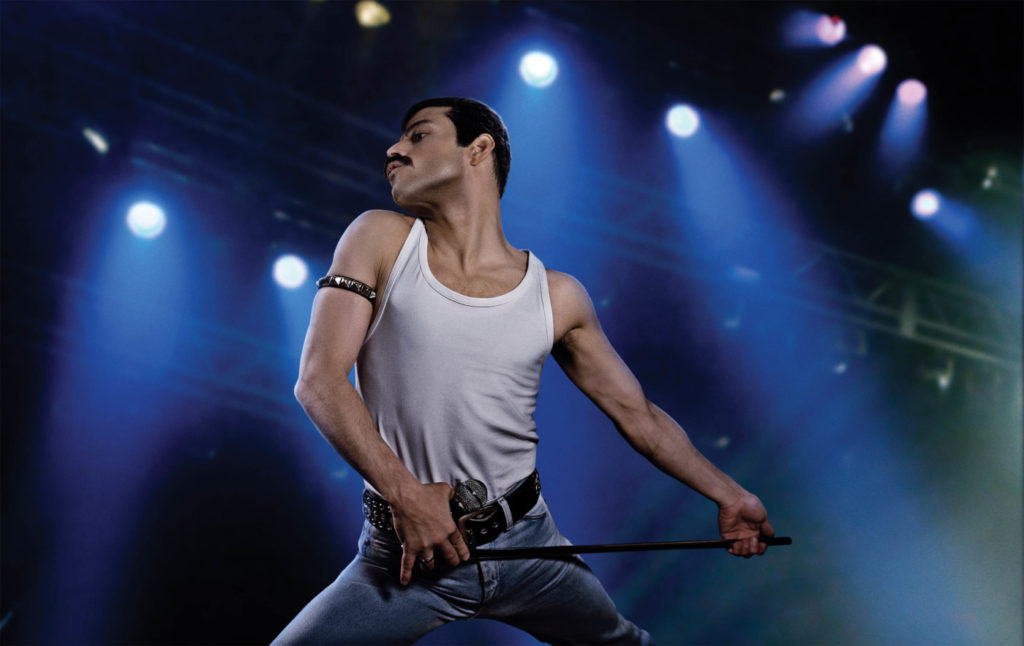It’s been over 25 years since the death of lead singer and flamboyant front Freddie Mercury, yet the music lives on. Freddie redefined and transcended stereotypes: Queen’s music refused to be slotted into any traditional genre. That’s the reason why the band is a cross-generational, multicultural and global phenomenon.

Emmy-winner Rami Malek (Mr. Robot), donning the skintight catsuit and holding that microphone stick, assumes the role of the king of pop rock in Bohemian Rhapsody, a celebration of Queen’s music and lead singer Freddie Mercury’s extraordinary life.
Starring alongside Malek is Lucy Boynton (Murder on the Orient Express) as Mary Austin, Gwilym Lee (Jamestown) as guitarist Brian May; Ben Hardy (The Women in White) as drummer Roger Taylor; Joe Mazzello (Jurassic Park) as bass guitarist John “Deacy” Deacon; Aidan Gillen (Game of Thrones) as Queen’s first manager John Reid; Tom Hollander (The Night Manager) as the group’s lawyer-turned-manager Jim “Miami” Beach; Allen Leech (Downton Abbey) as Paul Prenter, who started off as Reid’s assistant and became Freddie Mercury’s personal manager; Aaron McCusker (Shameless) as Freddie’s longtime boyfriend Jim Hutton; and Mike Myers (Austin Powers) as EMI Records’ Ray Foster.
Producer Graham King was persuaded to buy the rights to the story of Freddie Mercury and the band Queen by award-winning writer Peter Morgan. I was shooting the film Hugo, and Peter called me and asked me if I liked the band Queen,’ he recalls. “I said, yes, I love Queen! And he told me he was writing this script on spec and that no one had the rights to their story and that I should think about getting involved.” King knew something about Freddie’s life from having grown up in London in the 1970s and 1980s. After a phone conversation with Jim Beach, Queen‘s lawyer, King was introduced to Queen founders, guitarist Brian May and drummer Roger Taylor, and the deal was sealed. ‘’
King‘s track record as producer of award-winning films about such notable figures as Howard Hughes in The Aviator and Muhammad Ali in Ali, as well as former CIA officer Tony Mendez with Argo, assuaged their anxieties. “I come from an area of big Hollywood films, and I thought the story deserved to be told on that level,” says King. “The film is a celebration of the music as well as carrying on the legacy of Queen and Freddie and showing a whole new generation who Freddie was–his background in Zanzibar, his coming to London as an immigrant, the prejudice he dealt with growing up, his shyness and insecurities about his looks, how he battled on so many different fronts, his brilliance as a songwriter and musician, how he found another family in the band, his reinvention as a larger-than-life performer, while always remaining someone everyone loved who could get away with some very outrageous behavior–all framed by the creation of a sound that was innovative and groundbreaking for the time. The period from 1970 to1985 felt like the most important part of Freddie’s and the band’s life story, and it ends with the triumph of Live Aid.”

May and Taylor’s involvement ensured the film remained true to history. “The film is telling their life stories, and no one knows it better than them,” he says. “You can read as many books and magazine articles and watch as many videos and interviews, but when you can actually sit with the guys who can take you through the history, who can tell you anecdotes about Freddie that you’d never find out today, that meant the world to me. We all felt that we shouldn’t make the film unless everything was right–story, cast–everything else had to fall into place. The bottom line for me is for everyone involved to be proud of the storytelling, to be proud of a movie about their life stories that’s going to be shown around the world.” The project went through several incarnations until it finally reached the screen. May and Taylor were impressed by King‘s tenacity and commitment. “Graham King is a wonderful producer who has been with us all along the way,” says May. “There were moments when Roger and I thought it was never going to happen. The fact that Graham has managed to pull it together with such great team and cast is exciting.”
Freddie Mercury still holds special place in Brian May‘s heart. “There’re too many memories of Freddie. I remember that wicked smile and sparkle in his eye, and he would say something totally inappropriate and wicked. But he was funny and nice, and he didn’t have a bad bone in his body. He did have quite a quick temper, though, and he would react, but underneath that he was very shy. And if there was confrontation, he would deal with it, and then he didn’t want to know. I remember the great warmth Freddy had and how he wouldn’t waste any time on anything. He was always focused, he always knew what he wanted to get out of a situation. That’s a good lesson to learn rather than trying to please everybody else in a particular situation.”
How a Band Create their Music?
The film shows how the music came together. “How does a band create their music? That’s a really difficult thing to show on screen,“ he says. “The audience is going to really enjoy seeing that. It’s not just Freddie’s story, it’s also the story of how they created the sound. How did they invent ‘Bohemian Rhapsody,’ which was completely panned when it came out?”
One special scene was the band‘s first appearance on the legendary BBC-TV program Top of the Pops in 1974, featuring “Killer Queen,” which propelled the band to international stardom, because of Freddie’s outrageously suggestive performance and suggestive skintight outfit.
“Another band cancelled at the last minute, and we were suddenly in,“ says May. “But it was very strange for us because BBC policy then was that nobody played live, you played to track, and the singer lip-synced. It never felt comfortable for us because we were very much a live act. But it made us decide to make the video for ‘Bohemian Rhapsody,’ because we knew we would look ridiculous standing on the stage miming to that. Because the track got to number one and stayed there for six weeks, Top of the Pops played the video for six weeks. We didn’t realize that it was going to go all around the world and have the same effect. In Australia for example, where we hadn’t made much of a mark, it was enormous. That video really turned us into stars.”
Narrative Structure
The film begins and ends with Queen’s iconic Live Aid performance, on July 13, 1985., one of the most important cultural events of the 1980s, bringing together the world’s biggest superstars in a benefit concert on two stages, Wembley Stadium in London and the John F Kennedy Stadium in Philadelphia. Organized by Bob Geldof and Midge Ure to raise funds for those affected by Ethiopia’s famine, the concert was one of the largest satellite link-ups and TV broadcasts of all time, watched by an audience of 1.9 billion in 150 countries around the world.
The concert came at a pivotal moment, bringing the band back together after Mercury’s move to Germany, where he recorded two solo albums. It also came at a time when Mercury was at his lowest ebb, under the influence of Paul Prenter, surrounded by hangers-on who were exploiting Mercury’s generosity, and falling dangerously into a spiral of drug and alcohol abuse.
Queen‘s performance was a shot in the arm for the Live Aid organizers. “People were watching in the UK, but they weren’t calling in to pledge money, which was what the whole concert was about,” says King. “Freddie came on and did a set that the band had rehearsed for three weeks, so it was a perfect 20-minute set, and he brought everyone together. He made them realize what the event was all about.”
Mercury’s multi-cultural background: “Freddie was somebody who brought people together, no matter your race, your sexuality, your nationality; people joined together when Freddie came on stage. It was a moment that gave you the chills. When Freddie told people to phone in, people listened and started phoning in. Queen got the largest single donation, around £1million, which in those days was huge!”
The event had a special significance for those who performed there, like Brian May. “I can remember the rush, everything’s fast and it’s exciting,” he recalls. “Because it was a one-off and kind of terrifying in a very nice way. Like every gig, there was that great relief coming off the stage. You’re just glad nothing terrible happened, there were no train wrecks, and you’ve kind of acquitted yourself well. It was a great feeling, and I remember Bob Geldof was very pleased. It’s a great memory because everyone brushed their egos aside and supported and encouraged each other.”

Credits:
Anthony McCarten (Darkest Hour, The Theory of Everything) wrote the script from a story by McCarten and Peter Morgan (The Crown, The Queen).
The film is produced by Graham King (The Departed, The Aviator) and Jim Beach (The Krays, The Hotel New Hampshire) and directed by Bryan Singer (X-Men, Superman Returns).
Arnon Milchan (The Revenant), Denis O’Sullivan (World War Z), Justin Haythe (Red Sparrow), Dexter Fletcher (Eddie the Eagle) and Jane Rosenthal (The Wizard of Lies, About a Boy) are exec-producers.




Speak Your Mind